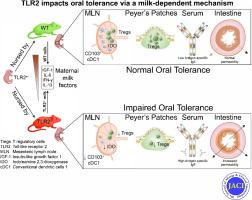Journal of Allergy and Clinical Immunology ( IF 11.4 ) Pub Date : 2020-02-15 , DOI: 10.1016/j.jaci.2020.01.049 Bassel Dawod 1 , Ian D Haidl 2 , Meghan B Azad 3 , Jean S Marshall 4

|
Background
The role of breast-feeding in the development of oral tolerance and allergic diseases is controversial, which could be related to variability in milk components. Toll-like receptor 2 (TLR2) is an innate immune receptor implicated in regulating allergic disease development.
Objectives
We examined whether deficiency of maternal TLR2 affects the normal development of oral tolerance and related immune parameters during lactation in a mouse model.
Methods
Heterozygous TLR2+/– pups from wild-type (WT) or TLR2–/– dams were fed either by their biologic dam or a dam of the alternate genotype. Development of oral tolerance to ovalbumin, levels of tolerogenic CD103+ dendritic cells, and regulatory T (Treg) cells, as well as intestinal permeability, were evaluated in these pups. The levels of key immune mediators in milk from TLR2–/– and WT mothers were also examined.
Results
Heterozygous TLR2+/– pups that were born to and nursed by TLR2–/– dams exhibited impaired oral tolerance. This was prevented by cross-fostering onto WT (TLR2+/+) dams. Impairments included selective elevation in anti-ovalbumin IgE in plasma following immunization, reduced numbers of tolerogenic dendritic cells and Treg cells in the intestinal tract, and increased intestinal permeability. TLR2 deficiency also affected milk content of insulin-like growth factor-1, IFN-γ, IL-6, and IL-13.
Conclusion
Our results underline a critical role for TLR2 in regulating milk components that are essential for development of oral tolerance in early life and demonstrate the importance of considering the immune status of nursing mothers in studies of immune development and responses.
中文翻译:

Toll样受体2通过牛奶依赖性机制影响小鼠幼崽口服耐受性的发展。
背景
母乳喂养在口服耐受性和过敏性疾病发展中的作用引起争议,这可能与牛奶成分的可变性有关。Toll样受体2(TLR2)是涉及调节过敏性疾病发展的先天免疫受体。
目标
我们检查了母体TLR2的缺乏是否会影响小鼠模型在哺乳期的口腔耐受性和相关免疫参数的正常发育。
方法
来自野生型(WT)或TLR2 – / –大坝的杂合TLR2 +/–幼仔通过其生物大坝或其他基因型大坝喂养。在这些幼崽中评估了对卵清蛋白的口服耐受性,致耐受性CD103 +树突状细胞水平和调节性T(Treg)细胞的发育以及肠道通透性。还检测了来自TLR2 – / –和野生型母亲的牛奶中的关键免疫介质。
结果
由TLR2 – / –水坝生下并由其哺育的杂合TLR2 +/–幼犬表现出口腔耐受性受损。通过在WT(TLR2 + / +)坝上交叉培育来防止这种情况。损害包括免疫后血浆中抗卵清蛋白IgE的选择性升高,肠道中致耐受性树突状细胞和Treg细胞的数量减少以及肠道通透性增加。TLR2缺乏症也会影响牛奶中胰岛素样生长因子-1,IFN-γ,IL-6和IL-13的含量。
结论
我们的研究结果突显了TLR2在调节牛奶成分方面的关键作用,这对于早期生活中的口腔耐受性的发展至关重要,并且表明了在免疫发育和反应研究中考虑哺乳母亲的免疫状况的重要性。











































 京公网安备 11010802027423号
京公网安备 11010802027423号